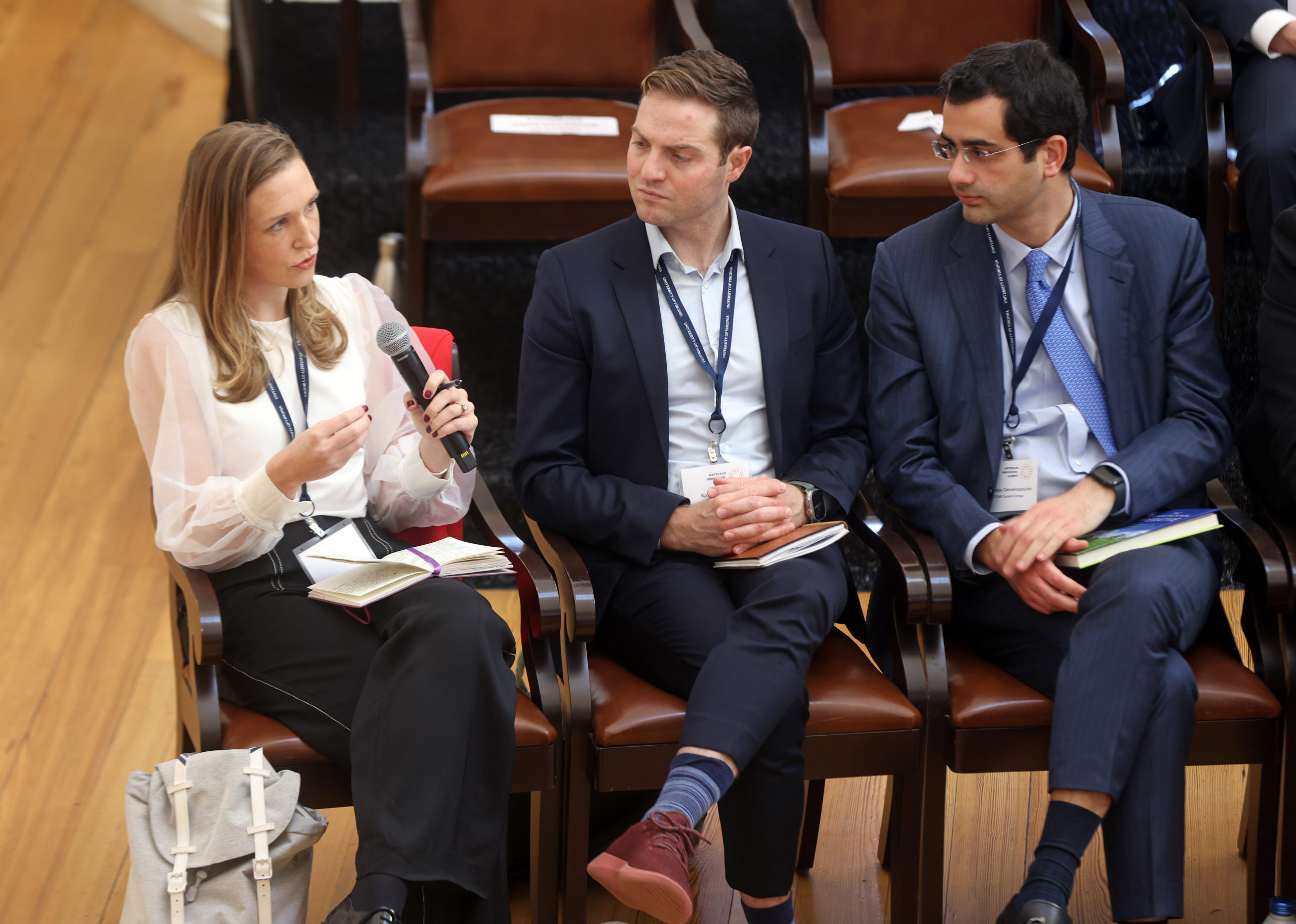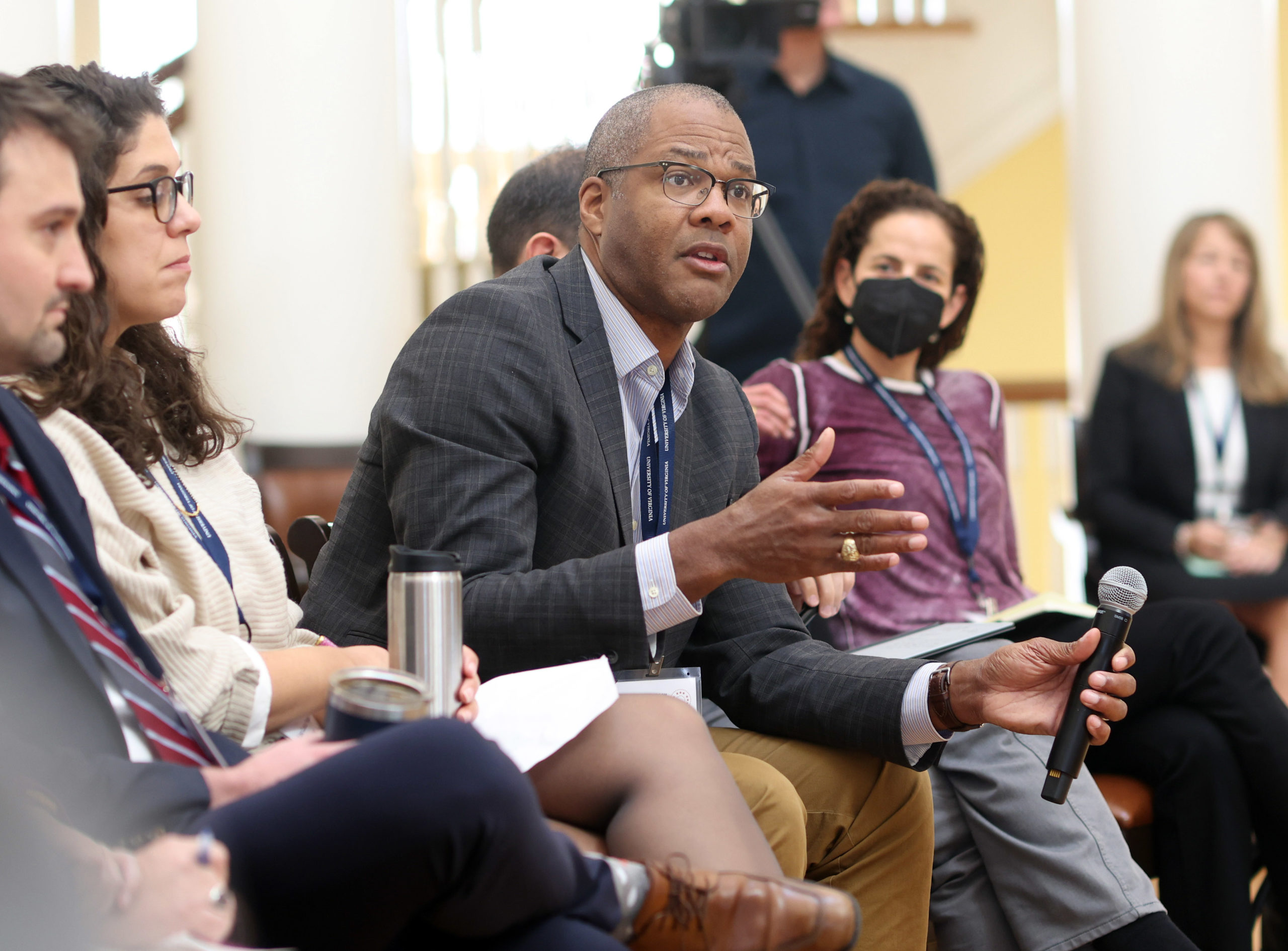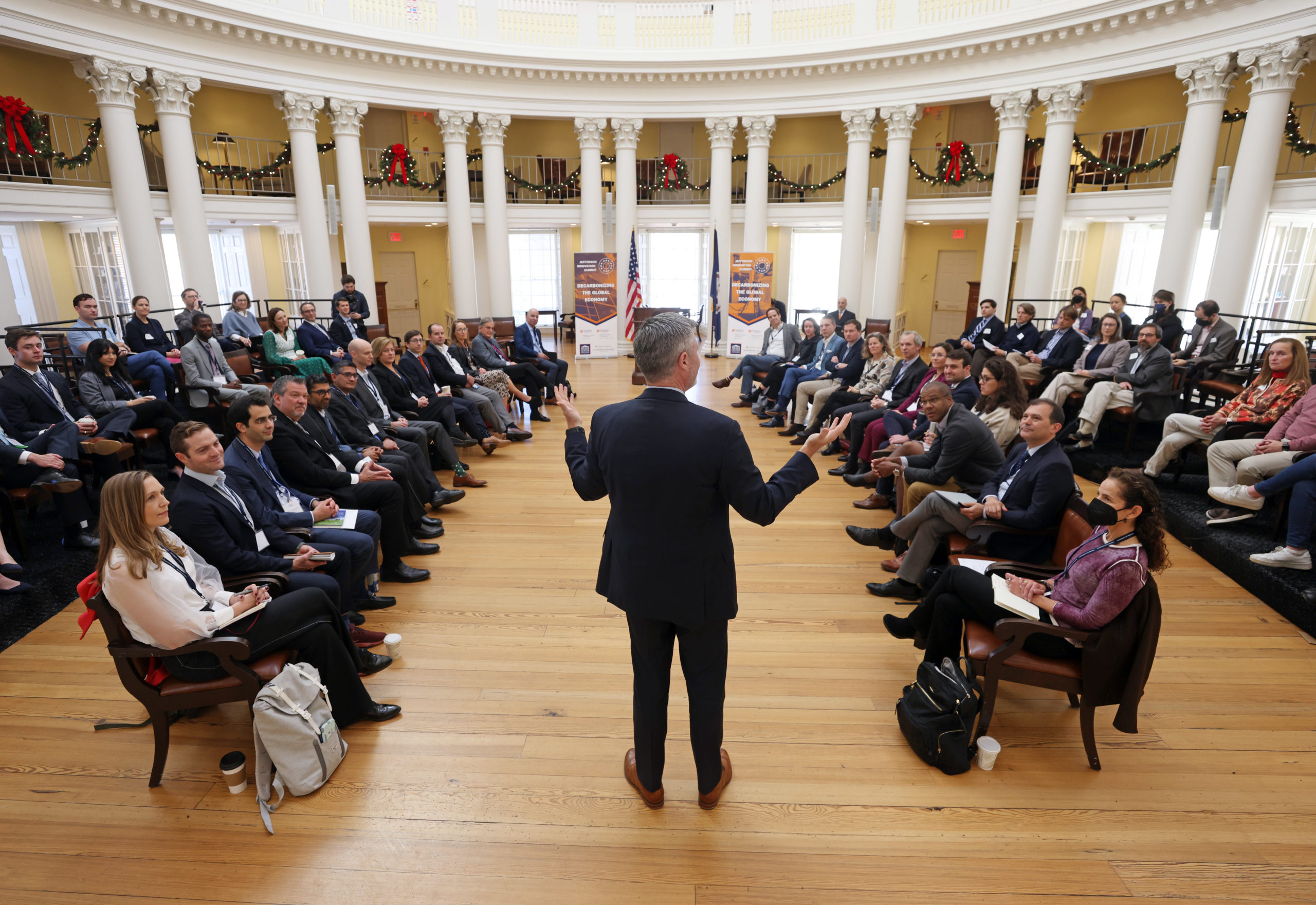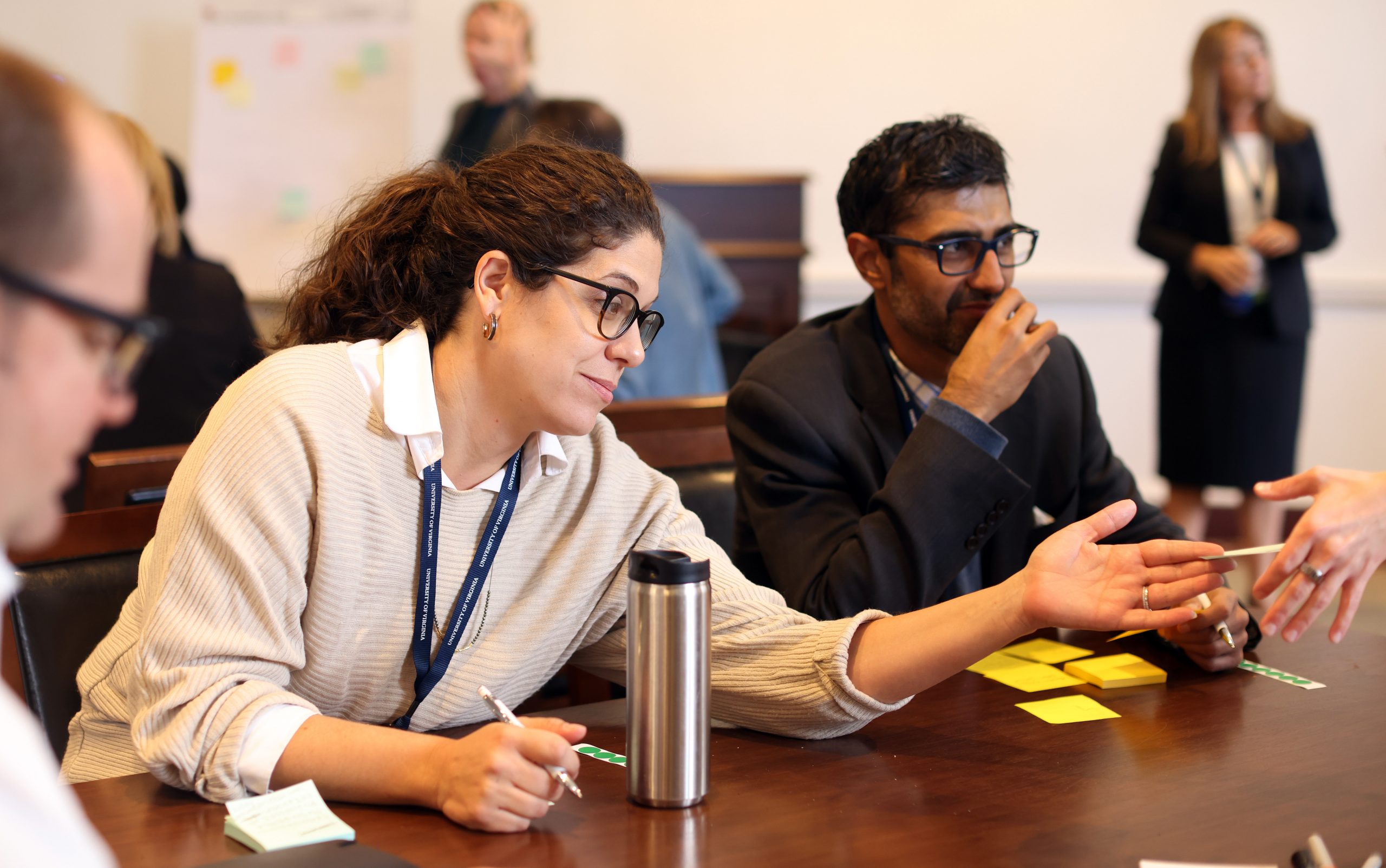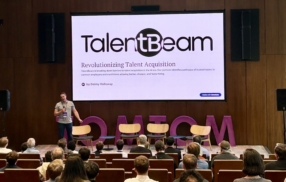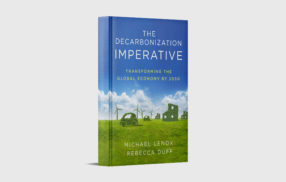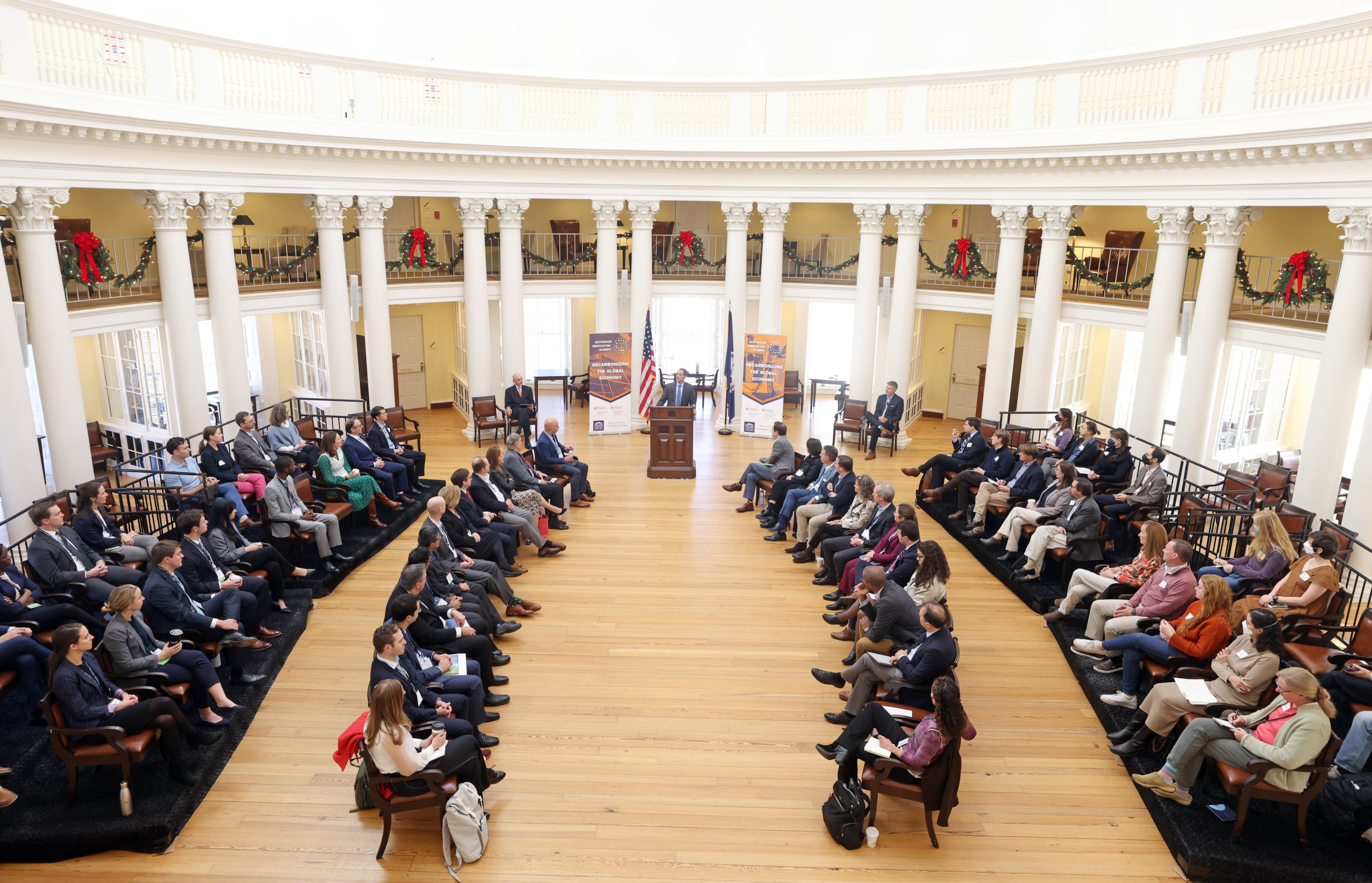
Industry, Policy Leaders Convene to Create Decarbonization Playbook at the Jefferson Innovation Summit
By Molly Mitchell
Delegates representing a wide variety of fields in business, industry, government, academia and non-profits convened in December at the University of Virginia’s historic Rotunda to discuss strategies for decarbonizing the global economy at the 2022 Jefferson Innovation Summit.
According to climate scientists, humanity will have to reduce net global greenhouse gas emissions to zero by 2050 to avoid the worst impacts of climate change. Achieving such decarbonization will require substantial innovation across virtually every sector of the world economy: transportation, energy, buildings, industrials, agriculture and the numerous downstream industries these sectors support.
Through a facilitated dialogue and workshop, the 25 delegates identified obstacles to decarbonization and worked together to come up with ideas for accelerating the market transformation needed to achieve it. These insights will be used to develop a decarbonization playbook, which will be published in the next few months.
This unique University-wide event was sponsored by Darden’s Batten Institute, Darden’s Institute for Business and Society, UVA’s Miller Center, and the UVA Environmental Resilience Institute and funded by The Jefferson Trust.
The Summit began with opening remarks from UVA President Jim Ryan and Miller Center Director and CEO Bill Antholis, followed by a Socratic-style dialogue between the delegates facilitated by Darden Professor Mike Lenox and observed by 40 UVA students, faculty and staff as well as members of the Charlottesville community. Lenox is co-author of “The Decarbonization Imperative: Transforming the Global Economy by 2050,” which served as a guide for the conversation. Delegates discussed the challenges, misconceptions and opportunities surrounding decarbonization in their respective sectors. “I believe that Universities have an important role to play in mitigating climate change,” said Ryan in his opening remarks. He said that universities provide places for experts to convene and environments where ideas are born. He also noted the importance of leading by example. “We’re a large institution, and we have a large footprint. We shouldn’t just be preaching; we should be practicing what we preach.” UVA aims to be carbon neutral by 2030 and fossil fuel free by 2050.
MORE: New Book From UVA Darden Professor, Senior Researcher Considers Need to ‘Decarbonize’ the Economy as Soon as Possible
Delegates present included UVA alumni Katherine Neebe (MBA ’04) of Duke Energy, Scott Price (MBA/MA ’90) of UPS, Arsalan Ahmed (MBA ’13) of Ecovyst, Will Teichman (MBA ’09) of Kimco Realty, Lindsey Hall of S&P Global Sustainable1, Dan Needham of Nucor Steel and Lars Norell of Altus Power. Key organizations represented included DOE, The Nature Conservancy, Impossible Meats and other leaders from a wide variety of fields.
Professor Lenox called on each delegate to share their views on efforts within their respective sector. The challenges are immense — on the theme of the built environment, Mark Lessans of Johnson Controls said, “We need to fundamentally change the way we use energy.” Technology solutions and alternative energy sources like solar, wind and hydrogen were much discussed, and voices like Neebe and Lisa Manley, of Mars Inc., brought the social implications of implementing new technologies to the forefront. “The social element is often under-discussed,” Neebe said. “We’ve got to think about equity; we’ve got to think about how to avoid the mistakes of the past.”
One important social element, which is inextricably tied up in land use and agriculture, is the lives and livelihoods of smallholder farmers. “Far too many smallholder famers, who grow cocoa and vanilla and so many of the things we love to consume, are in poverty,” said Manley. “And therefore can’t make investments in climate-smart agriculture. I think a lot of us need to be thinking not just about the innovation, but about equity and the role that farmers — smallholder farmers in particular — will play in driving solutions.”
The open discussion was followed by an ideation session and concept development workshop to develop a playbook that details the top policy actions needed to decarbonize the global economy. For this discussion, delegates were assigned tables to ensure a diversity of representation. The process started with the creation of more than a hundred ideas and ended with 5 policy actions that the group believed were critical to moving us forward.
Rebecca Duff, Director of Initiatives at the Batten Institute and Co-Chair for the Summit said, “Many conferences exist that bring together experts within a single sector to discuss the challenges of climate change. We purposely designed this Summit to convene leaders across all the critical industry sectors to share their experiences and perspectives with one another, working toward solutions that will benefit all stakeholders.” Duff added “All of these sectors are connected and to some degree reliant on each other to achieve decarbonization. Only through multi-sector collaboration can we truly understand the barriers to decarbonization and identify the actions needed to meet our climate change goals.”
The decarbonization playbook will be available on the Jefferson Innovation Summit website in the coming months.
The University of Virginia Darden School of Business prepares responsible global leaders through unparalleled transformational learning experiences. Darden’s graduate degree programs (MBA, MSBA and Ph.D.) and Executive Education & Lifelong Learning programs offered by the Darden School Foundation set the stage for a lifetime of career advancement and impact. Darden’s top-ranked faculty, renowned for teaching excellence, inspires and shapes modern business leadership worldwide through research, thought leadership and business publishing. Darden has Grounds in Charlottesville, Virginia, and the Washington, D.C., area and a global community that includes 18,000 alumni in 90 countries. Darden was established in 1955 at the University of Virginia, a top public university founded by Thomas Jefferson in 1819 in Charlottesville, Virginia.
Press Contact
Molly Mitchell
Senior Associate Director, Editorial and Media Relations
Darden School of Business
University of Virginia
MitchellM@darden.virginia.edu


